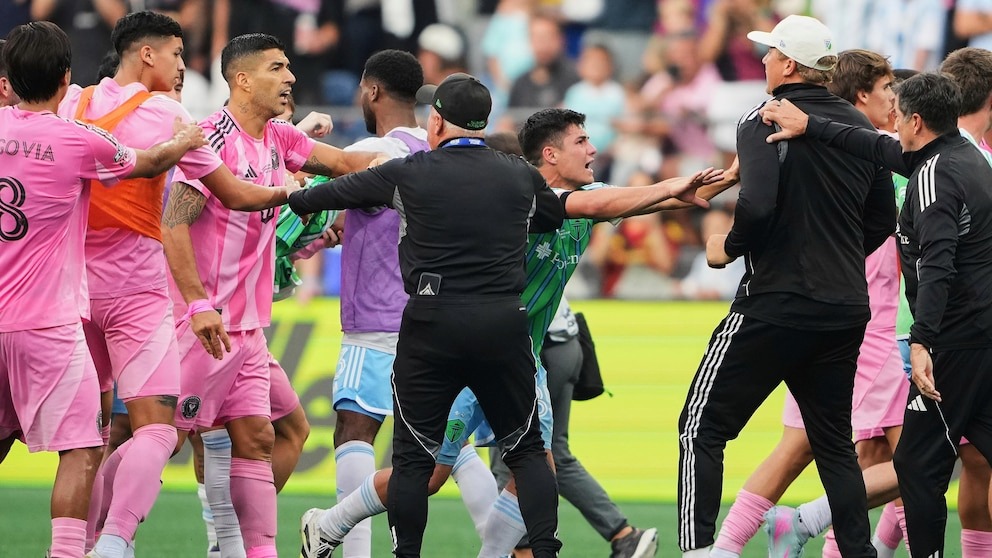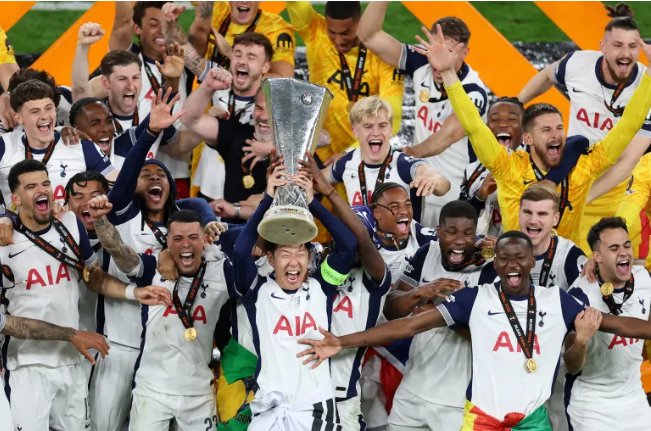Luis Suárez has once again found himself at the center of controversy after being hit with a Suárez Six-Game Suspension following Inter Miami’s fiery defeat to the Seattle Sounders in the Leagues Cup final. The veteran striker, now 38 years old, was sanctioned after ugly post-match scenes overshadowed Seattle’s emphatic 3-0 victory at Lumen Field. The suspension was announced by the tournament’s disciplinary committee, confirming that Suárez’s punishment will apply to the next edition of the Leagues Cup, while Major League Soccer reserves the right to impose further action if necessary. The disciplinary committee announced the following suspensions after reviewing the incidents from the Leagues Cup final:
Luis Suárez (Inter Miami): Spitting at a Seattle Sounders staff member – 6-match suspension
Sergio Busquets (Inter Miami): Violent conduct – 2-match suspension
Tomás Avilés (Inter Miami): Aggressive behavior – 3-match suspension
Steven Lenhart (Seattle Sounders staff): Breach of competition regulations – 5-match suspension
The trouble began immediately after the final whistle, when Suárez lost his cool in a heated exchange with young Seattle midfielder Obed Vargas. The Uruguayan put the 20-year-old in a headlock, sparking a full-scale melee that dragged in players and staff from both teams. Amid the chaos, Suárez was caught on camera spitting in the face of Seattle Sounders director of security Gene Ramirez, an act that led directly to the Suárez Six-Game Suspension. Officials rushed to restore order, but the incident quickly became the talking point of the final, overshadowing Seattle’s deserved triumph on the pitch.
Disciplinary Sanctions and Official Response
The disciplinary committee acted swiftly, issuing a range of sanctions to players and staff involved in the melee. Suárez received the heaviest punishment, but his Inter Miami teammates Sergio Busquets and Tomás Avilés were also penalized. Busquets was banned for two games for violent conduct, while Avilés received a three-match suspension for his aggressive behavior.
On the Seattle side, coaching staff member Steven Lenhart was handed a five-match suspension for his involvement in the post-match scenes. These punishments were accompanied by undisclosed fines, with the committee making it clear that such actions would not be tolerated in the competition.
In response to the backlash, Suárez issued a public apology on Instagram. He admitted that his actions came during a “moment of great tension and frustration” but stressed that it was no excuse for such behavior. “I was wrong and I sincerely regret it. I feel bad about what happened, and I want to apologize to everyone who felt hurt by what I did,” wrote the striker. The apology acknowledged the seriousness of the Suárez Six-Game Suspension and attempted to repair some of the reputational damage caused by his outburst.
Legacy of Controversy and Future Implications
For many football fans, however, this incident was not entirely surprising. The Suárez Six-Game Suspension adds to a long history of disciplinary controversies throughout his career. In 2014, Suárez was infamously expelled from the World Cup in Brazil and banned for four months after biting Italy’s Giorgio Chiellini. Earlier in his career, he served bans for other biting incidents at Ajax and Liverpool, earning a reputation as one of football’s most combustible characters.
In 2011, he was suspended for eight games in England after being found guilty of racially abusing Manchester United defender Patrice Evra. His infamous handball in the 2010 World Cup quarter-final against Ghana also cemented his place as one of the sport’s most polarizing figures. The current Suárez Six-Game Suspension has therefore been viewed by many as yet another addition to a controversial legacy.
The fallout from the incident has also affected Inter Miami, a club that has drawn global attention thanks to the presence of Lionel Messi, Suárez, and other big-name stars. With Busquets and Avilés also banned, Miami now faces a period of scrutiny as it seeks to rebuild its image. The club issued a statement condemning the altercation, insisting that the behavior of its players does not reflect the values of the organization. For Miami, which has ambitions of becoming a powerhouse in Major League Soccer and beyond, the Suárez Six-Game Suspension is a setback that raises questions about discipline and leadership within the squad.

From Seattle’s perspective, the victory should have been a night of celebration, but the violent post-match scenes somewhat overshadowed their triumph. The Sounders dominated the final, defeating Miami 3-0 with a commanding performance, yet much of the coverage focused on the clash involving Suárez. Fans and commentators alike criticized the Uruguayan’s actions, with many insisting that a strong punishment was essential to uphold the credibility of the tournament. The Suárez Six-Game Suspension was therefore welcomed by many in the football community as a necessary step to maintain discipline and set an example for future competitions.
Looking ahead, the suspension means that Suárez is unlikely to feature in the next edition of the Leagues Cup. With his contract at Inter Miami set to expire soon, questions remain over whether this was effectively his final act in the competition. At 38 years old, Suárez is nearing the twilight of his career, and the Suárez Six-Game Suspension could prove to be one of his last major headlines in the sport. For Major League Soccer, the decision on whether to impose further domestic sanctions will be closely watched, as it could have a direct impact on Miami’s season.
The incident has sparked wider debates about discipline in football. Many fans argue that while Suárez’s talent on the pitch is undeniable, his repeated lapses in judgment have often overshadowed his achievements. For Inter Miami, the challenge is not only to compete at the highest level but also to manage the reputational risks that come with employing such a controversial figure. The Suárez Six-Game Suspension is a reminder of how quickly moments of indiscipline can tarnish the image of a player, a club, and even an entire competition.
The Suárez Six-Game Suspension is a defining moment that once again places the spotlight on one of football’s most controversial stars. While Suárez has apologized and accepted responsibility, his long history of misconduct means that public opinion is divided. For Seattle, the final will be remembered both for their victory and for the chaos that followed, while for Inter Miami, the incident serves as a warning that discipline must be prioritized as much as ambition. The legacy of the Suárez Six-Game Suspension may therefore extend far beyond this year’s Leagues Cup, shaping how both Suárez and his club are perceived in the years to come.
FAQs on Suárez Six-Game Suspension
Q: Why was Suárez banned for six games?
Suárez received a Suspension for spitting at Seattle Sounders director of security Gene Ramirez after the Leagues Cup final.
Q: Does the suspension apply to MLS matches?
No. The suspension applies only to the Leagues Cup. However, MLS has the right to extend further punishment if deemed necessary.
Q: Were other players punished?
Yes. Sergio Busquets received a two-match ban, Tomás Avilés was suspended for three matches, and Seattle staff member Steven Lenhart received a five-match ban.
Q: What does this mean for Inter Miami’s future?
The club must manage reputational damage while preparing for next year’s competitions without several key players due to suspension.


